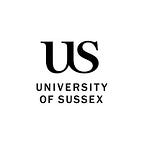“Students were so hardworking this time round.”
Forty years after first arriving at the University of Sussex as a Physics student, Gary Strain returned to campus to use his brain again. This week he graduated with a Masters in Astronomy.
I’d always wanted to do a Masters in Astronomy. My first degree at Sussex was in Physics (1978–1981), and then I took a MPhil (1981–83). My education served me well — I worked as a technology executive for 35 years, spending time in Singapore, India and Australia. After I retired in 2017 and had taken time out to do cycling trips and the like, I thought I really needed to use my brain again.
The Astronomy department has expanded massively since the early Eighties. It was a fairly small subject area at Sussex but now it’s so broad and has so many strengths. A lot of my work involved analysing the data from the Hubble Telescope and the James Clerk Maxwell Telescope, and the Dark Energy Survey. It was academically very demanding and was like a highly intensive computing exercise.
I was genuinely impressed with the quality of the teaching. I’m sure that 40 years ago the faculty saw teaching as a background activity to their research. But now across the board there’s an emphasis on good teaching. They seem to have such a high workload that I don’t know how they find the time to do their research.
My fellow students this time around were so hardworking and drank much less. I’m not surprised that students achieve such high grades now. They certainly put in the work and are highly focused on their careers. Forty years ago we weren’t that worried about getting jobs after university. We just assumed we would get them.
I feel really lucky to have had my early experience at Sussex too. I chose it because of its academic reputation, but also because of its location. I’m from Northern Ireland, and was leaving my home town when the” troubles” were at their height. I liked it that Sussex was not in a large city, but that it was vibrant and political. Meeting people who were from all over the world really opened my eyes. It was a very formative experience for me. Up until that point I had only ever met people who were Irish or English.
I made lifelong friends at Sussex. We still meet up — and will probably have a big gathering this year as we’ll all be sixty. I lived in York House to begin with, and then in East Slope. I met my first wife on my course and we have three children, the youngest of whom, Harry, came to Sussex to study Computer Science. Harry and one of my original Sussex friends are coming with me to my graduation ceremony
A lot of the buildings are the same on campus, so it looks familiar. But of course there are a lot more students now, which came as a surprise. I know that’s a sign of the times, and I think that my generation were extremely lucky to have been able to enjoy the campus as it was all those years ago…for free!
I was thinking of doing a PhD at Sussex, but my wife now has a job in Australia so I shall be living out there. I don’t want to go back into the tech industry, but I’m thinking about teaching. I’ve realised that I’m not quite ready to do nothing.
Interview by Jacqui Bealing
This profile is part of our This Sussex Life series.
Visit the University of Sussex website
